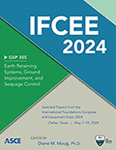Effect of Freeze-Thaw Cycles on Slope Stability in Cold Climates
Publication: IFCEE 2024
ABSTRACT
Freeze-thaw cycles are closely related to the slope instability in the seasonally frozen areas. During winter, soil moisture content decreases forming ice segregates, which increase the stability of the slope. The slopes are the strongest in the winter when ice forms. However, when the ice melting starts in the spring season, formation of stagnant water lubrication between the melting soil and freezing soil interface constitutes the weak interface of landslide hazard. As temperature starts increasing, the ice melts and the soil moisture content increases dramatically. The excessive moisture content generates porewater pressure and reduces soil strength, which contributes to slope failure. In this study, a numerical model using GeoStudio has been developed to simulate freeze and thaw condition in a shallow slope. TEMP/W and SEEP/W modules are used to perform coupled conductive thermal analysis, which generates both heat and water mass transfer inside a slope. Later using the generated pore water condition, slope stability analysis is conducted using SLOPE/W. After that, a transient seepage model was developed incorporating rainfall intrusion in the slope with the thawing process for the same duration. The model showed that slope stability increases with the decreasing pore water pressure during cold weather. The slope stability decreases from 1.7 to 1.2 during the thawing. This phenomenon is due to the absorption of heat followed by rapid rising in soil temperature. This research will be helpful for the decision makers as a guide for highway slope construction and act as an early warning tool in the snow melting period.
Get full access to this chapter
View all available purchase options and get full access to this chapter.
REFERENCES
Abu-Hamdeh, N. H. (2003). “Thermal properties of soils as affected by density and water content.” Biosystems Engineering, 86(1), 97–102.
Aldaood, A., Bouasker, M., and Al-Mukhtar, M. (2016). Effect of water during freeze–thaw cycles on the performance and durability of lime-treated gypseous soil. Cold Regions Science and Technology, 123, 155–163.
Chen, J., Zhang, M., Wang, H., and Li, L. (2015). “Evaluation of thermal conductivity of asphalt concrete with heterogeneous microstructure.” Applied Thermal Engineering, 84, 368–374.
Côté, J., and Konrad, J. M. (2005). “A generalized thermal conductivity model for soils and construction materials.” Can. Geotech. J., 42(2), 443–458.
Fricke, B. A., Misra, A., Becker, B. R., and Stewart, W. E. (1992). “Soil thermal conductivity: effects of saturation and dry density”. In Thermal Performance of the Exterior Envelopes of Whole Buildings V International Conference, Clearwater Beach, Florida, USA.
GeoStudio. (2023). Reference manual of “Stability Modeling with GeoStudio”, https://downloads.geoslope.com/geostudioresources/books/11/2/SLOPE%20Modeling.pdf.
Gong, Y., He, Y., Han, C., Shen, Y., and Tan, G. (2019). Stability analysis of soil embankment slope reinforced with polypropylene fiber under freeze-thaw cycles. Advances in Materials Science and Engineering, 2019, 1–10.
Groisman, P. Y., Knight, R. W., and Karl, T. R. (2001). Heavy precipitation and high streamflow in the contiguous United States: Trends in the twentieth century. Bulletin of the American Meteorological Society. 82(2): 219–246.
Guo, Y., Shan, W., Jiang, H., Sun, Y., and Zhang, C. (2014). The Impact of Freeze–thaw on the Stability of Soil Cut Slope in High-latitude Frozen Regions. Landslides in Cold Regions in the Context of Climate Change, 85–98.
Jia-Bao, X. S. H. Z., Jian-Li, L., and De-Li, C. (2002). “Suitability of models describing soil water retention curve.” Acta Pedologica Sinica, (4), 6.
Kanitpong, K., Benson, C. H., and Bahia, H. U. (2001). “Hydraulic conductivity (permeability) of laboratory-compacted asphalt mixtures.” Transportation Research Record, 1767(1), 25–32.
Korshunov, A., Churkin, S., and Nevzorov, A. (2014). Numerical simulation of laboratory freezing tests of frost-susceptible soils. In Proceedings of the 8th European conference. Delft, The Netherlands (pp. 18–20).
Korshunov, A. A., Doroshenko, S. P., and Nevzorov, A. L. (2016). The impact of freezing-thawing process on slope stability of earth structure in cold climate. Procedia engineering, 143, 682–688.
Liu, F., Liu, Z., Yin, F., Zhang, S., and Wang, Y. (2018). “Effect of GCL on Moisture and Temperature Fields of Highway Subgrade Through Numerical Analysis.” In International Congress on Environmental Geotechnics., Springer, Singapore, 608–615.
Shi, X. (2014). Controlling thermal properties of asphalt concrete and its multifunctional applications. Master’s thesis, Texas A & M University, Texas, USA.
Wang, D., Yang, C., Cheng, G., Ma, W., and Zhang, L. (2020). Experimental Study on Pore Water Pressure and Microstructures of Silty Clay Under Freeze-Thaw Cycles. Lect. Notes Civ. Eng., 2, 239–254.
Yang, Z., Lv, J., Shi, W., Zhang, Q., Lu, Z., Zhang, Y., and Ling, X. (2021). Model Test Study on Stability Factors of Expansive Soil Slopes with Different Initial Slope Ratios under Freeze-Thaw Conditions. Applied Sciences, 11(18), 8480.
Information & Authors
Information
Published In
History
Published online: May 3, 2024
ASCE Technical Topics:
Authors
Metrics & Citations
Metrics
Citations
Download citation
If you have the appropriate software installed, you can download article citation data to the citation manager of your choice. Simply select your manager software from the list below and click Download.
